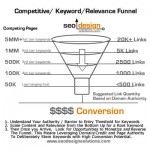Many of you may be wondering, what is it that search engines look for in a good design? Why is it, for example that some websites rise to the top of the SERPs (search engine result pages) like a Zeppelin and others fail to impress the bots and sink like stones? The answers are all elementary my dear Watson, but knowing the who, what, where when and how is always better than pure speculation.
So let’s get started then.
For the sake of elaboration we will classify this phenomenon into reasonably bite sized chunks of information:
1. Content
2. Design
3. Links
4. Promotion
5. Visibility
Content:
Content is one of the main ingredients on how your website is evaluated. Believe it or not, the Google Bot, Slurp and others are rather intuitive in discerning if you are utilizing 2nd grade grammar for example or a P.H.D vocabulary. The operative suggestion here is to write with purpose. The keyword density for your keywords should not exceed 3-5% of the total words in your documents (it should be enticing to humans, yet have enough value to provide a shadow for the keywords you wish to rank for) using a word 3 times is simply not enough, unless we are discussing a more advanced SEO technique. Use bold tags, italics and hyper links strategically, but make sure not to detract from the user experience by going overboard.
Design:
Design and layout are responsible for determining relevance. The higher a link on the page, the more of a priority it represents. Spiders read from left to right, so your first words should ideally be an h1 tag (the basis of the page). By matching the H1 tag, the title and the description, you are essentially stating that this page is about the subject in question. Also, try to have the page start on topic and end with a recap, spiders love it when you start with a key phrase, they see it 4-5 times in the course of 1000 words and then you end on that note.
In addition, having a solid link architecture in addition to theming the flow of your internal pages is enough to augment and reinforce rankings. Themed websites would have a root with the categories stemming from it using succinct forms of naming conventions that tied into the main theme.
For example if your website is about automobiles your sub folders could contain makes and models so as the domain was returned in search engines, those keywords work on your behalf. This theming of the internal link structure works particularly well in Yahoo. Within those folder, you could have another sub folder parts, accessories , etc. You see the point. As long as the pages are no more than two clicks away from the home page, your good to go.
Blogs already use this formula for categories and the name of the post (h1 tag) becomes the file name, which is why word press has had such success in regard to optimizing the content for search engines. In addition, it uses pure .css which is a plus since the code validates and the content, images and other elements are all structured in a method that is consistent to how user agents and bots like to skim and interpret data.
Links & planting the seeds of popularity:
Links are the infrastructure of the internet and are essentially responsible for how spiders crawl your pages and find websites from the web at large. With so many articles and posts on link building, the value of links, how they pass rank, if they have authority and numerous other variables to consider, instead of getting into all of that, lets just say if you are serious about achieving rankings for just having something in your description tag alone, you need a plethora of links in order to exude this type of website authority.
For example, if you type in your URL in Google, how many search results do you see? 300, 1000, 10,000? Assessing this as link popularity on a global scale can provide an idea of just how visible your website is (from an objective perspective). Combine this with the types of links and the anchor text (the text in the link) and you can pretty much identify what someone ranks for and why. Like they say, everything leaves a trail, and this is a testimony to the fact. Think like a spider and you can find your competitors secret stash and add those links strategically to assist your own rankings, or start looking for fresh prospects in which to sow vital seeds that will one day blossom and return with traffic, relevance and notoriety for your website.
Promotion
If you want to get the word out, you need to think outside the box. Social networking and social bookmarking are excellent viral marketing tools that you can use in addition to link bait (writing compelling blurbs to hook and entice people to learn more about your site or posts) and is an excellent strategy to use in conjunction with traditional link building methods.
You build links so that you naturally rank higher for specific terms in search engines. In this way you can control the type of traffic you attract. But when you use social media optimization or social marketing as a tool, it fulfills another unique attribute that search engines like to see in order to elevate your website into another level of regard – traffic. Social sites can produce traffic, say for example you rely to heavily on one method, sure you can have top 10 positions for a number of terms, but if nobody clicks them in comparison to how many searches are conducted, you can rest assured that your position will not be top 10 for long. A wide array of ranking factors come into play and traffic and visibility is one of them.
Make sure your titles and descriptions sell on your behalf, it may be the only chance you get to see a decision maker again. Problem and solution based catchy titles can augment your relative position.You may not be above the fold, but if your listing stands out, or is unique in any way, then you could see higher click through rates and conversion.
Visibility
What can be said about visibility that hasn’t been said before? Probably not much, other that the fact that statistics have proven that a ranking in the #1 position gets 70% of the traffic by default. If that’s not incentive enough, maybe the fact that you can type in the term and hit the I feel lucky button in Google can bestow some SEO bragging rights. To each their own, but personally, I just like the feel of being rewarded as a result of giving the search engines what they want.











